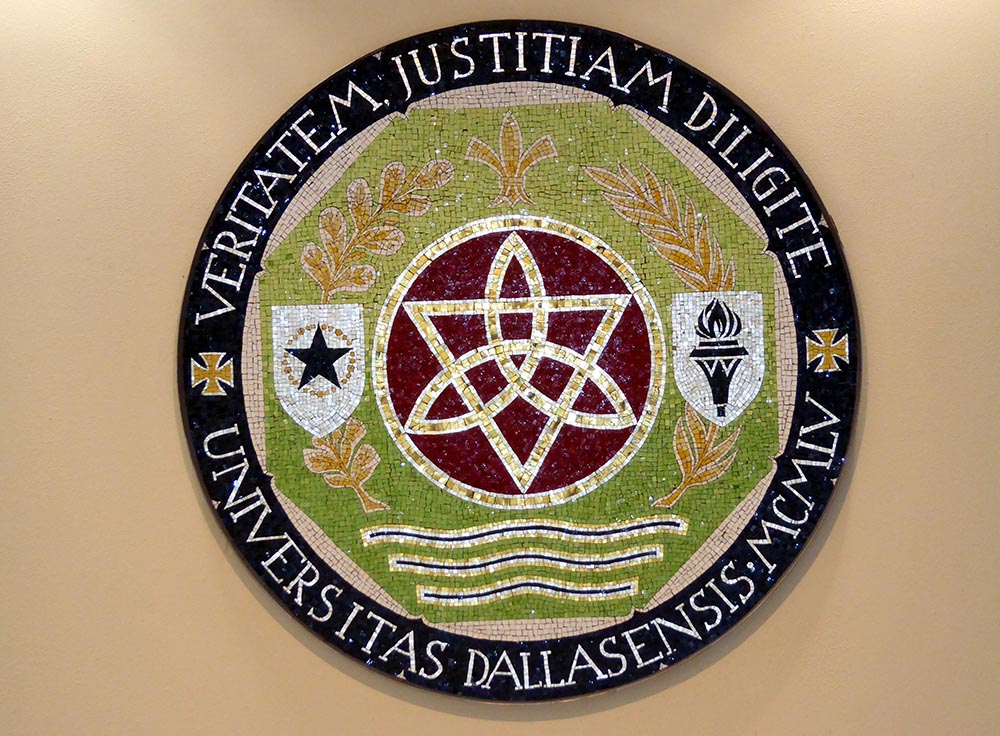
A mosaic of the seal of the University of Dallas is seen in the Haggar Student Center in Irving, Texas. (Wikimedia Commons/Wissembourg)
If you graduated from the University of Dallas (which is actually located in Irving, Texas) in the late 1970s to the early '80s, you are definitely a fellow baby boomer. You probably also maintain the kind of bond with your college pals that gets created when you live and breathe with a certain group of people all day and all night for four years. You were formed by your UD experience, and all these years later, you hold onto those times.
From the first day of freshman year, the UD core courses immersed you in ancient Greece. You may not have been ready for this plunge into the classics of Western civilization: Every required class, of which there were many, started out in ancient Greece: literature classes, history classes, philosophy classes, even art and theater history classes.
Plato and Aristotle and Homer filled your thoughts and essays. "The Magnanimous Man" and "The Tragic Flaw of Hubris" and "The Greek Chorus's Theatrical Legacy" were topics of conversation in the cafeteria and along the walkways and over beers, the last of which had to be acquired in nearby Dallas by someone with access to a car, as Irving was dry. The drinking age in Texas was 18 at the time, and you observed it regularly.
You may have wondered why you had to study Greek gods and Greek poets and Greek philosophers at a Catholic institution. The Catholics came later, of course, but all civilization apparently rooted in those Greeks. You felt heartily sick of the Greeks by the end of your first semester. But you remember the lessons.
The professors at UD encouraged you to think, to rethink, to ask questions, to doubt everything you'd been taught, to examine, to appreciate, to discard, to argue, to write, to orate, to participate. They valued the intellect as well as the spirit. Classes were small and actually taught by the professors, rather than by graduate assistants. Some professors had even written the textbooks, some in second languages. These were breathtakingly smart people. They were also available to their students, in their offices and around campus, over coffee or stronger beverages.
The entire undergraduate population was small enough that you at least recognized other students, even if you didn't know their names. At UD, you felt seen. You felt heard. You felt yourself a part of something bigger, even if you didn't articulate that to yourself at the time.
In the last century, the religious aspect of attending a Catholic university was soft-pedaled at UD. You didn't really know if your professors were Catholic. There was a chapel and a chaplain, and you had to take three theology classes if you'd put Catholic on your application, but it didn't seem to matter if you weren't Catholic. There was no requirement to go to Mass. There was no litmus test to be a UD student, other than a willingness and a capacity to learn. UD sent you on the journey of a lifelong learner.
Am I romanticizing our time at UD? Possibly. Aging does that. Back in 1975, my father was taken with the idea of UD as "a school for leaders," which was the admissions office's come-on line when they recruited me. My dad didn't quite know what to do with me, as it hadn't previously occurred to him that a school-smart girl child would want to go to college. Juxtaposed with the upheaval of the women's liberation movement, perhaps the thought of a daughter who could be a leader intrigued him. They also offered me a merit-based scholarship, which sealed the deal for my dad.
I was on board the minute I read about the obligatory sophomore semester in Rome. I loved those four years at UD. I blossomed. I became myself. I left with a sense of purpose, a heart for mission, and a future husband.
But where did that beloved university go?
Advertisement
Over the ensuing decades, while my husband and I, both UD alum, were raising children and becoming leaders in our own ways, it came to pass that UD changed. I first became aware of this when I was informed that the University of Dallas, along with Franciscan University of Steubenville, was an approved school for the offspring of the "rad-trads," the radical-traditional wing of Catholics who believe things like the Second Vatican Council were a big mistake. (A self-described rad-trad person told me this, in disbelief that a misguided soul such as myself had gone there.)
UD definitely continued to produce leaders, as some of its alumni have long figured politically in right-of-center organizations and other positions of power. UD made headlines for decisions that would have seemed improbable in my day, like lobbying for the presidential library of George W. Bush, which is when some alumni stopped donating their money. (Southern Methodist University in Dallas got the library.)
And lately, my alma mater has been in the news for reasons too distressing to ignore. Last fall, the UD administration tabled a student organization that was dedicated to the "fruitful discussion" of racial justice. The organizers of the proposed Student Leaders for Racial Justice were passed over for permission to start their club on campus, in part because the club might somehow make it harder for students of different races to become friends.
In the time of Black Lives Matter and the police killing of George Floyd, that was some sickening press for UD. But more than that, shouldn't advocating for racial justice be an integral part of Catholic social justice teaching? (The club, now named Student Leaders for Racial Solidarity, was since approved on Feb. 5 by UD President Thomas Hibbs.)
More recently, in January 2021, a UD faculty member committed to a public Facebook page (since removed) some venomous views on the federal nomination of a trans woman to the Department of Health and Human Services. Since this type of dangerous ignorance about LGBT people touches one of my children directly, I find it insupportable that a professor from the institution I graduated from would engage in such intolerant and unloving aspersions.
So I do what I can: I write. I sign my name to open letters of protest. I commiserate with my fellow alumni. I tell my children, this is not your mother's UD. Fun fact: my oldest daughter was accepted to UD back in 2001, but decided not to attend. I would not send a child there now.
Am I writing an obituary? A tribute? A cautionary tale? A farewell?
All of the above, perhaps, and maybe none of them. I feel compelled to provide a first-person record of a long-ago place that was pivotal to my growth as a human being and as a mature Catholic. I write in appreciation for the professors, many now gone, who shaped my beliefs and honed my ethics and encouraged my forays into leadership. Finally, I write with some sadness that the temporal passes away, but with gratitude that grace once bestowed can never be lost.
In my day, UD President Donald Cowan said things like, "I have spoken of this campus as an intellectual community because it is the search for the intellect that brings us into common purpose. But we come to know that the intellect has no boundaries, that it penetrates every action, sharpening our wit, blunting our anger, softening our grief; and we find, indeed, that intellectus and caritas become inseparable — that understanding and love are single in the ability to bind individuals into a community" (Convocation address, 1977).
That's the UD I love. That's the UD that loved me. That's the UD I miss.







